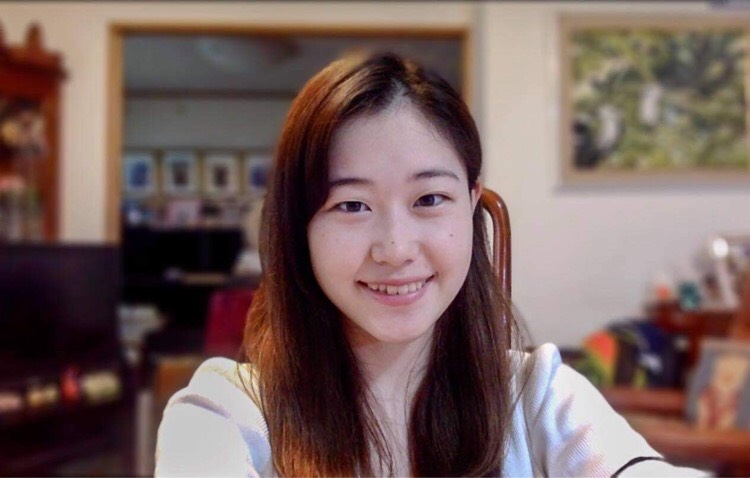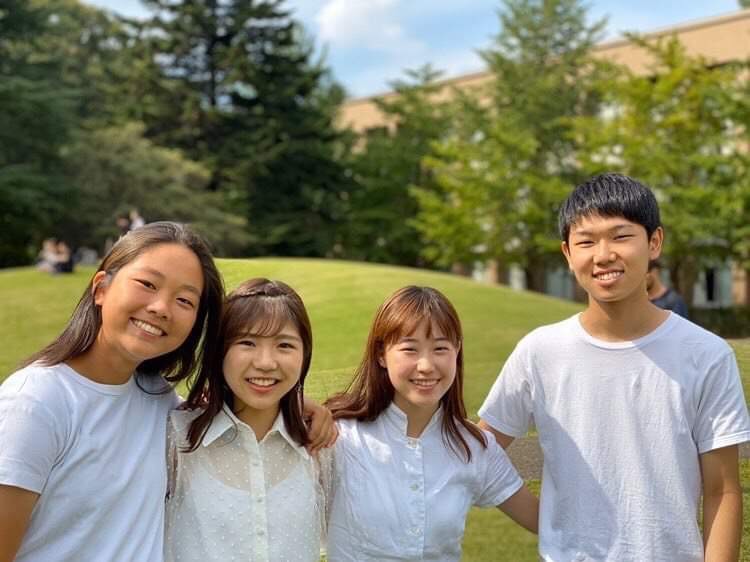Part 1: ICU PRISM’s Sari Kamiyama: “bridging the gap” to make small changes.
Interview Vol. 11 features a gender activist, Sari Kamiyama, who is an active member of ICU PRISM. We will split her interview article into two parts and release them in separate weeks. This week, we are releasing Part 1. What is her activism about? What led her to this activism? What is her role in “bridging” people? Read the full article to find out!

Q1: What kind of activism do you do?
In addition to my work with ICU PRISM, I’m also active on social networking sites as an individual.
The main goal of ICU PRISM is to make ICU a safe space for everyone, and I’m mainly involved in organizing and speaking at events, communicating through social media and podcasts, and the sanitary products project. There may be less outright discrimination nowadays, but people are still hurt or bothered by microaggressions (unconscious prejudice and discrimination without malice) and stereotypes, and some lack confidence in their identity. In order to change this situation, we believe it is necessary to relativize the position of the majority and understand the structure of power relations. This is where I think gender and sexuality research, which critically rethinks the existing social constructs from a gender perspective, will be of great significance. As a first step, I would like ICU PRISM to act as a platform that provides a place to talk about gender issues casually, and as a source of information that disseminates clear, accurate information, thereby creating an opportunity for many people to get involved in gender studies.
As an individual, my main focus is to combine gender and art in my dissemination efforts. I post pictures of my friends’ gender stereotype experiences. I found out that many people struggle and feel uncomfortable in various situations, and I feel grateful for them for sharing with me, as well as feel their pain. I hope that by verbalizing and visualizing the difficulty of living, I can help people feel more comfortable, even if only a little.
Q2. Please tell us more about ICU PRISM’s events.
When the President of ICU delivered a declaration about SOGI (sexual orientation and gender identity) diversity at ICU, we were invited to talk about four gender issues in ICU and their solutions. First, we highlighted discriminatory comments and harassment by faculty and insisted on the importance of gender education to faculty members in order to create a safe environment where students can speak up about this issue.
Second, we pointed out poor access to sanitary napkins and a lack of consideration towards transgender students regarding bathroom amenities on campus. We asked the university to make sanitary napkins more accessible to all ICU students and place sanitary napkin disposal bins in both men’s and women’s bathrooms. Third, we brought up the university’s lack of education on SOGI diversity and sexual consent at the student orientation and talked about the need for mandatory sexual health education. Lastly, we stressed the need for sexual care service on campus for pregnant students, students with unintended pregnancy, and students who unintentionally make other students pregnant.
We’ve organized both in-person and online events so far. The topic of our in-person event in June of last year was sexual consent, and we provided a chance for our participants to read the sexual consent handbook together and discuss it. We picked this topic because we found it problematic that there was no sexual consent workshop in the first-year orientation program though there were mandatory workshops as to drinking and drug, and we wanted to address this issue. We’ve also held two online events for recruiting new members. We created a space where participants and the members were able to have a casual discussion on gender-related topics together.

Q3. How did you feel after organizing events?
What I learned from event organization is the importance of consideration. We realized talking about gender-related topics with strangers is not an easy thing, so we set some ground rules to create a safe space, considered the safety of our online platform, picked discussion topics that everyone could talk about, and gave a short presentation about each discussion topic so all our participants were able to understand the topics regardless of their background knowledge. The events were also good opportunities for me to reconfirm my feelings towards what I was doing at ICU PRISM. Through my activities at ICU PRISM, I want to bridge the gap between academia and people who are not familiar with gender studies and minimize the difference in people’s gender literacy levels. I’d rather discuss gender-related topics with a variety of people than live in an ivory tower.
Q4. What specifically do you do for ICU PRISM’s social media activities?
What I’m doing in ICU PRISM is to share gender-related content on our social media page and to release podcast episodes. Specifically, on our social media page, I’m trying to create an overview of gender studies so everyone can get to know what it’s about. For example, what theories, concepts, and discussions other than feminism exist in gender studies, what gender studies is trying to tackle, etc. This overview is exactly what I wanted when I started studying gender studies. Now I have access to a rich pool of gender-themed academic sources and a variety of gender studies courses at university, so I’m utilizing this privilege and trying to make gender studies more accessible to everyone. When I make a post, I use academic sources as a reference but at the same time, I put a lot of effort into designing the posts to make them more attractive and easy to understand. In my opinion, thinking about how to make a good post is an adventure rather than duty. If I change the font, text size, color, and medium depending on who I want to reach, I receive different feedback. I find this very fascinating.
For our podcast, we invite professors and graduate students to our podcast episodes and interview them regarding their gender-related research. As both an interviewer and a listener, I really enjoy listening to all sorts of stories and views! Also, I love how I can see the field of gender studies more objectively.
In my opinion, there is a distance between scholars of gender studies and students, such as undergraduate students and high school students. However, if we only feature topics that are familiar to everyone on our social media pages, the content will be most likely to be shallow. I always make sure our podcast episodes “bridge” the gap between researchers and our listeners, especially high school students who are interested in making a career in gender studies. We have been inviting scholars that we know to our episodes, so I think it would be awesome if we can invite researchers from the academic field that seems to have no connection with gender studies. For example, physics!
Q5. Please tell us more about your Sanitary Napkin Project.
This project aims to improve access to sanitary napkins at ICU, and we collaborated with Red Box Japan, which is an organization working on free sanitary napkin campaigns at schools. As requested by the ICU President, ICU PRISM conducted a survey on sanitary napkins in ICU and collected answers from 180 people. The results showed that 69% of commuters and 61% of dorm students ve had trouble with access to sanitary napkins. The main cause was that there were only two places–Sanseido Bookstore and the gym–where students can buy sanitary napkins on campus. Some students told us they didn’t have napkins when they had spotting or that they didn’t have time to go buy napkins during the 10-minute break. After hearing their voices, we realized how much this was a serious issue. Right now because of the pandemic, we are not able to carry out our project as we planned, but we are planning to run an online event with Red Box Japan and Ayumi Taniguchi, an activist working for ”#minnanoseiri.” I’m so happy that all-gender bathrooms have been installed in the Honkan Building this year, and I think this provides us with more opportunities to make our campus a safe space.
Q6. When and how did you start your activism in ICU PRISM?
I started to get involved in ICU PRISM in May of my first year.
In one of the gender studies classes, my classmates and I were talking about why ICU didn’t provide students with a workshop about sexual violence, sexual harassment, and especially campus rape, even though there were mandatory workshops about alcohol and drug. We gathered at CGS (Center of Gender Sexuality) where we had weekly meetings before the pandemic, and this was the beginning of ICU PRISM.
Also, I’d wanted to do activism since I was in high school, so I had a clear image of it. This feeling and the question we came across in the gender studies class matched and led me to ICU PRISM. My classmates from the gender studies class became members of ICU PRISM, and now we are working together.
Q7. What was your feeling when you started your activism?
In the beginning, I thought that if we speak up, we can create change. However, in reality, even though we wanted to ask the university to run a workshop about sexual consent in the first-year orientation program, we had no idea to whom we should ask. Even when we figured it out and tried to reach out to them, we weren’t able to do it because of the university’s position and the Center for Gender Studies (CGS)’s institutional position within the university as just one of the several research centers.
I also found myself questioning if it was okay to talk about sex this much, even though we were holding our event about sexual consent. I had this inner conflict between the desire to make a change and questioning, “is it okay to do this?” I myself felt uncomfortable talking about sex. This was because I had heard negative and stereotypical comments around gender activism, such as “if you do such activism, you won’t be able to marry” and “talking about gender is perverted.” Since I was told to be “normal” when I was in middle school and high school, I was scared that people might not accept me if I was doing such activism.
But I changed my mind and started thinking, “I don’t want to waste my university life worrying about what other people think about me.” I became passionate about doing something that gets society involved and something that can bring small changes to ICU. Now I strongly believe it’s very important to be open to gender-related topics.
How was the interview article Vol.11 Part 1?
Part 2 will be released in October. 4th.
She will talk about what motivates her, what “student organization” means to her, what messages she has toward the society, and more.
Don’t miss it!
ICU PRISM Website:https://icuprism23.wixsite.com/prism
Instagram:@kamisari.tweety , @icu__prism_23, @gender4youth
Twitter:ICU PRISM , @konnichihane